10 Ways You Can Help Your Dog Enjoy His Senior Years
This post may contain affiliate links. We may earn money or products from the companies mentioned in this post.
You love your senior dog and want him to live a great life.
After all, he’s your best bud and has always been there for you. And you’ve shared so many adventures over the years.
But you wonder: how can you ensure that he’s happy and healthy?
In this blog post, I’ll lay out some ways you can help your dog enjoy his senior years to the fullest.
I appreciate and love my senior pups. We’ve had so much fun together.
I currently have two seniors. My sheltie Murphy is 10.5 years old and my rescued golden retriever Riley is 9.5 years old.
They’re still very active and participate in many activities. Riley is still obsessed with fetching his Kong ball.
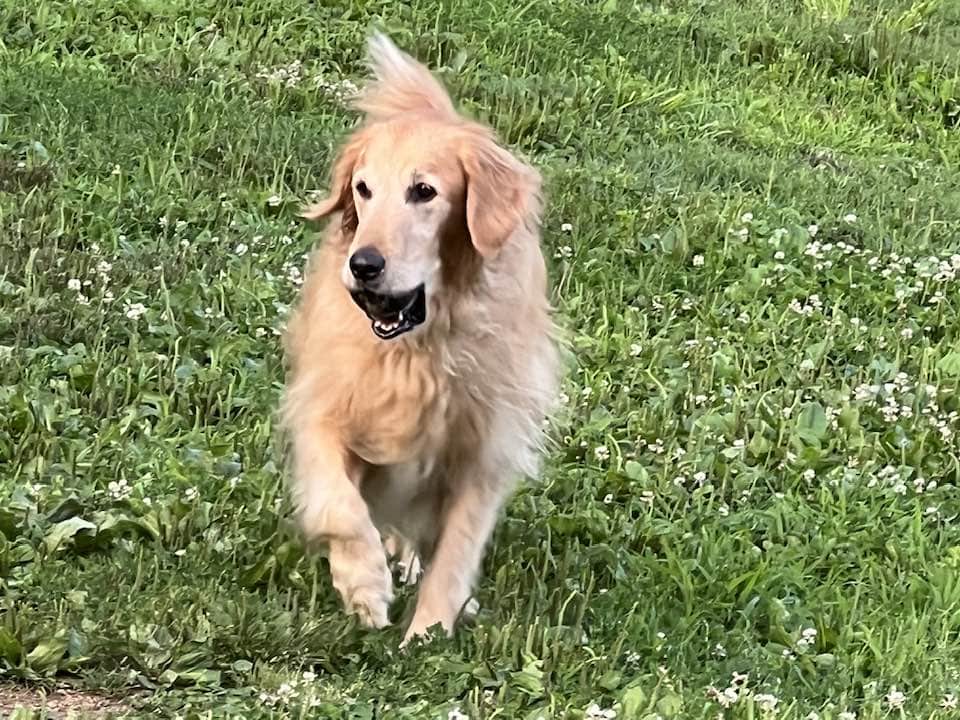
Riley carrying his Kong Extreme ball
And although Murphy’s muzzle is graying, he still happily chases after his soft frisbee.
(20+) Facebook (video of Murphy chasing his soft frisbee)
I just make sure that the sessions are shorter and less intense than when they were younger.
When are dogs considered to be seniors? Small dogs, between 10 to 12 years old. Medium dogs, between eight and nine years old. And large dogs, between six to seven years old.
So let’s discuss how to make your canine best friend’s senior years his best ones.
1.Have Regular Vet Visits
When your pup was younger, a yearly check-up may have been sufficient. But, as he ages, the American Animal Hospital Association recommends vet visits every six months.
During these wellness checks, your vet will also be able to catch any problems and treat them early.
After all, dogs get many of the same illnesses that we do as they enter their golden years. They may get joint issues, vision loss, hearing loss, heart disease, diabetes, and more.
So a full check-up is in order. This often includes senior bloodwork.
My sheltie Murphy recently had one of his check-ups and the vet found some liver and other values that were off. So he had an ultrasound and is now on medicines to keep him healthy.
If he hadn’t gone to the vet, I never would have known that he required treatment because he didn’t yet have any symptoms of a problem.
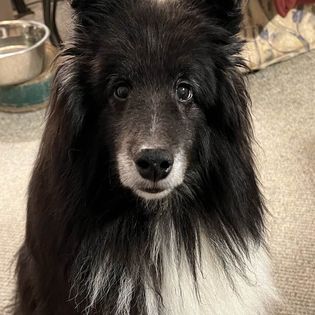
Murphy’s graying muzzle
2. Be Aware of Physical and Mental Changes
Dogs often hide pain from us. It’s a survival-of-the-fittest skill. So be aware of any changes in your dog.
Does he seem to be in pain? Does he get up more slowly or tire more easily? Does he not want to participate in favorite activities any more?
Also see if there are any behavioral changes. Has he become aggressive or does he avoid being touched? This can be a result of pain or other changes.
Does he seem to be confused in regular settings? This can be a result of dementia, Canine Cognitive Dysfunction, or hearing or vision loss.
So note any changes–whether sudden or not–and bring them up to your vet.
3. Keep Your Senior Dog Physically Active
Keeping your pup physically active is important. Of course, this depends on what he’s capable of doing.
Muscles support joints and, with good muscle tone, mobility increases. And moving joints are less likely to become stiff.
Instead of runs, a slower, shorter walk may be in order. Just don’t overdo it.
Changing your walking route can also sometimes make a walk more interesting to your canine companion.
Or take him to a new place to walk. Go on a sniffari.
Ball-playing sessions may need to be shorter or less intense. If you’re not sure of your dog’s limits, check with his vet.
My senior golden Riley still plays ball. But our sessions are a lot shorter than when he was younger.
4. Keep Your Senior Dog Mentally Stimulated
Don’t forget to also stimulate your dog’s mind. Some seniors suffer from cognitive dysfunction.
Teach him some new behavior cues as he can handle it. You can give rewards other than treats too so that he doesn’t gain weight. Add some tricks. Rotate his toys.
Add some puzzle toys to the mix to help stimulate your pup’s mind. Start with easy ones at first, so that he can use them without becoming frustrated.
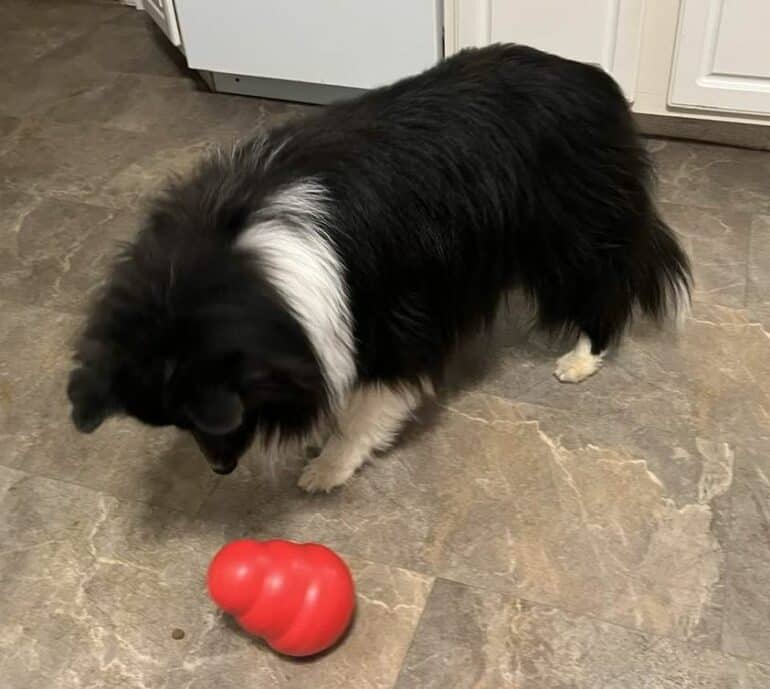
Murphy with Kong Wobbler
You can even hide some treats or toys around the room for him to find.
Enrichment activities can be very beneficial in keeping your senior dog’s mind active–and his life interesting.
5. Keep Your Senior Dog Safe
Because of cognitive dysfunction, a physical problem, or hearing or vision loss, a senior dog may become confused or not be able to navigate his environment like he did when he was younger.
So watch him closely. And manage his environment so that he’s safe.
If he’s outside, make sure that he’s safely enclosed in your yard. And you should keep an eye on him to be sure that he’s alright.
Indoors, make sure that pathways aren’t blocked.
Some seniors suffer from mobility issues and it may be more difficult for him to get up or navigate slippery floors such as tile, hardwood, or linoleum which may not provide great traction.
And you may need the following to help him remain safe and uninjured:
- Gates. Gates can help block off stairs and doorways.
- Ramps and stairs. Ramps and stairs made for dogs can help your dog get on furniture and even into your car. Train your dog to use these so that he doesn’t get injured or frustrated.
- Rugs and non-slip mats. You may need to place runners that give your senior traction where needed.
- Be aware of his presence. Your dog may not hear or see you walking nearby. So watch out for him so that neither of you is injured.
A friend of mine put carpet runners for her border collie mix Buddy when he became a senior because he started to slip when walking on the hardwood floors in their home. This made it safer–and not distressing–for him when he got up.
When my golden Spencer became a senior, he had a tumor in his spine and could no longer jump into the minivan on his own. So I got him a ramp and trained him to use it.
He was about 80 pounds and there was no way I could lift him. Then he could still go on some adventures with us.
6. Give Him an Appropriate Diet and Supplements if Necessary
Senior dogs need a high-quality, nutritious diet. You want to make sure that he’s fed an appropriate amount and has a balanced diet.
Check with your vet or a nutritionist if you’re not sure what’s appropriate for your dog.
Your senior pup probably isn’t as active as he was during his younger years. So he may need a different food or lesser quantity to remain fit.
Obesity is bad for canines like it is for us and can shorten one’s life. And it can lead to joint and heart problems as well as other diseases.
Check with your vet whether you should add any of the following to your senior’s diet:
- Probiotics or digestive enzymes to help aid in digestion and nutrient absorption
- Joint and other supplements to help with mobility
- Omega three fatty acids for brain, skin, and joint health
- Plain pumpkin which provides fiber and can help with constipation and diarrhea
- Bone broth for bone and joint support
I give all of my dogs salmon oil in their food once a day. And when my dogs reach middle-age, I give them an appropriate joint supplement, which is given at a higher level as they age.
My pups have remained active into their golden years.
7. Cater To Your Senior’s Special Needs
Your senior dog has special needs. He probably has to potty more often. Some seniors become incontinent. And he may have aching muscles and joints.
So you may need to provide some of the following aids to help make his life better:
- Potty pads, diapers, belly bands, and extra potty breaks. You may need to ensure that your senior dog has access to potty more often.
- Special harnesses and lifts. Your senior dog may need certain aids to help him get up or walk.
- Special bowls. Elevated bowls can help some seniors.
- Senior carriages. For longer excursions, your dog may need to accompany you in a buggy designed for dogs.
- Warmth. Seniors are often more susceptible to cold, so make sure that he’s not subject to drafts. And he may need a warm towel or doggy heating pad to help soothe aching joints. Dogs with short coats may need to wear a sweater or coat to stay warm.
- Cool temperatures. When it’s hot outside, ensure that your dog doesn’t overheat. Make sure he has access to shade outside and a fan or air conditioning inside. And cool water.
- Orthopedic bed. He may need a bed that cushions his joints.
- Cold lasers. These can increase circulation and provide pain relief.
- Massage. This can help increase blood flow to joints and muscles, keeping muscles supple.
- Acupuncture. This can help relieve pain in some dogs.
- Chiropractic adjustments. This can help with arthritis in the spine.
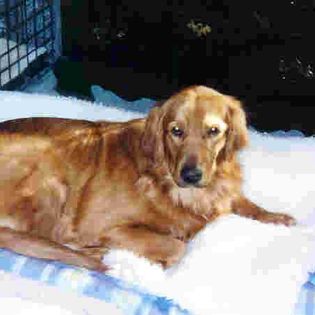
Spencer on orthopedic bed
My sheltie Duffy was a very active dog throughout his life. He participated in competitive obedience, therapy work, fun agility, and even herded a beach ball back to me in the yard!
But when he became a senior, I saw him slow down. And he seemed to be in pain at times.
So, in addition to vet-recommended supplements and medicines, I had him treated with acupuncture. It seemed to help him with pain control.
My rescued sheltie Lady was a senior when I adopted her–estimated to be about seven or eight.
She had the sweetest disposition and loved everyone. She even became a therapy dog accompanying me to visit hospital patients.
But after a couple of years, I saw that she wasn’t able to easily take long walks. So we took shorter ones.
And I bought a doggy carriage for her when we went on longer excursions.
I used to rent a house down the shore for a week during the summer. Dogs were allowed on the boardwalk.
So we took her in the carriage on the boardwalk so she could accompany the rest of our pack. It looks like a regular baby carriage.
The expressions on people’s faces when they saw it was a dog in the carriage were priceless!
8. Grooming
Senior dogs need regular grooming. During grooming sessions, you can check your pup’s doggy condition.
And check him over for lumps, bumps, and visible parasites. This can help you catch any issues before they become major problems.
Regular brushing, combing, clipping, and bathing as necessary help stimulate skin and keep your dog healthy.
Because of limited mobility, he may not be able to keep himself clean like he used to. So you may need to do a sanitary trim. And don’t forget to brush his teeth and keep his nails trimmed.
Your pup will look forward to the attention and time to bond with you.
9. Give Your Senior Extra Attention
Your pup will probably love receiving extra care. You may just spend some extra lounging time at home together.
Or take him on special outings, such as to a new pet store or friend’s house.
Or even to a dog training class that’s appropriate for a senior dog. Older dogs can learn new tricks!
You just want to increase the quality of his life with activities that he will benefit from and enjoy.
My senior dogs still come with me to train. I just don’t have them do as much as they did when they were younger.
They know when we’re heading out for an adventure–and even wait patiently by the door when it’s time to go.
I love my senior dogs. Whether I’ve had them from puppyhood or they came to me later in life, I always have a special bond with them. They’re like an old friend who knows you well.
10. Be Patient and Enjoy the Golden Years
You obviously love your dog or you wouldn’t be reading this blog post. But sometimes in the hustle-and-bustle of everyday life, it’s easy to take time for granted.
Remember to be patient and give your beloved senior more time for tasks that used to be easy. And enjoy each day.
Dogs don’t think about time. But we do. So have fun and live in the moment–as our dogs would want us to do and like they do!
FAQs
My lab is 10 years old. He used to love to run with me but doesn’t want to any more. Is this normal?
Yes. As dogs age, they often aren’t able to participate in the same activities that they were able to when they were younger. But have a full vet check to make sure that there’s nothing wrong and if there’s anything that can be done in case there’s a problem.
My 12-year-old maltese is gaining weight. What should I do?
Have a vet check to be sure everything’s alright. Talk with your vet about whether you should change your dog’s diet or amount you feed. And check what type of activity he should participate in to stay healthy.
Can my senior spaniel still do obedience?
Sure–if he’s physically and mentally able to participate in the activities, they should help him have a better quality of life.
Final Thoughts
Senior dogs may have certain needs and limitations from when they were younger. But if you take the right precautions and actions, they can still live fulfilling lives in their senior years.
Do you have or have you had a senior dog? Please tell us about it in the comments section below.
Save To Pinterest
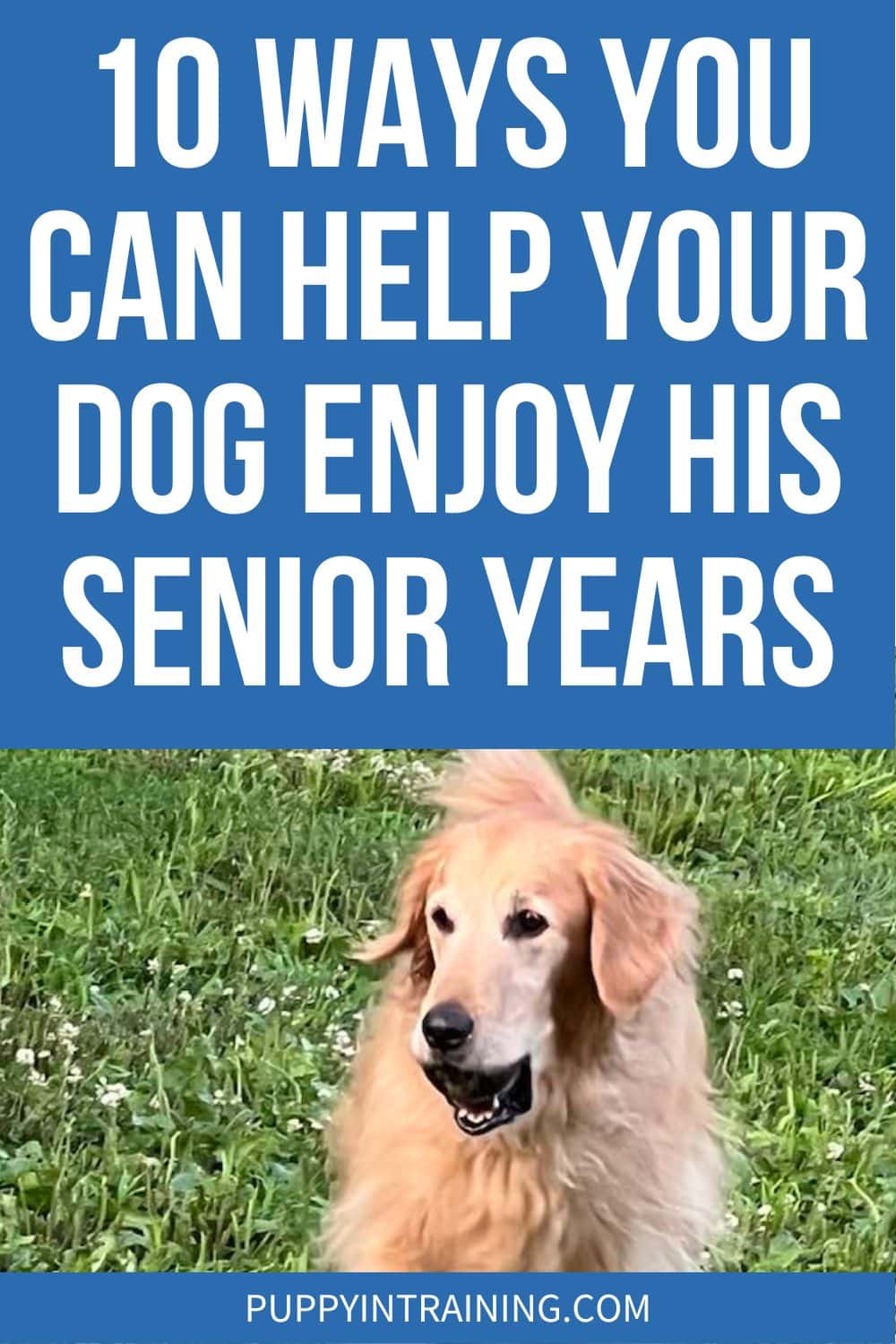
Top Picks For Our Puppies
- BEST DOG CHEW
We Like: Beef Collagen Sticks - All of our pups love to bite, nip, and chew. We love using Collagen Sticks to help divert these unwanted behaviors. - BEST PUPPY TOY
We Like: Calmeroos Puppy Toy w/ Heartbeat and Heat Packs - Perfect for new puppies. Helps ease anxiety in their new home. - BEST DOG TREATS
We Like: Crazy Dog Train-Me Treats - We use these as our high-value treats for our guide dog puppies. - BEST FRESH DOG FOOD
We Like: The Farmer's Dog - A couple months ago we started feeding Raven fresh dog food and she loves it! Get 50% off your first order of The Farmer's Dog.
Check out more of our favorites on our New Puppy Checklist.
As a devoted parent to three senior dogs, this article on enhancing their golden years resonates deeply. The bond we share strengthens through extra attention and patience, as I strive to make their later years as joyful and comfortable as they’ve made mine.